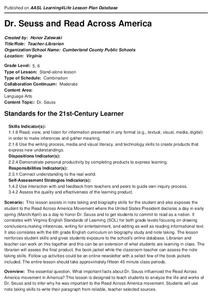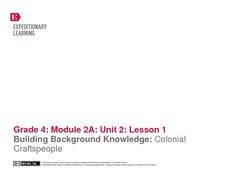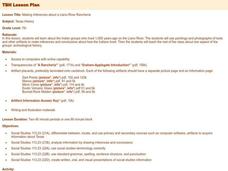EngageNY
Reading and Taking Notes on Colonial Trades
In the tenth instructional activity of this unit, young scholars learn to categorize information as they continue researching their colonial trade. During guided practice, the teacher models how to read informational text slowly while...
Curated OER
Using Pre-reading Strategies: Infer
Use this resource to support your class practicing inference with poetry and visual art. The plan calls for an examination of "The Scream" by Edvard Munch and the "Mona Lisa" to promote speculation about artist's intent. From there, it...
Curated OER
Dr. Seuss and Read Across America
What important facts about Dr. Seuss influenced the Read Across America movement...? This is the driving question of a research project that requires scholars to find information about Dr. Seuss' life and work. Class...
National Endowment for the Humanities
Poems that Tell a Story: Narrative and Persona in the Poetry of Robert Frost
Dig in deeper with Robert Frost's, "Stopping by Woods on a Snowy Evening." Learners will read and discuss poems by Robert Frost and learn the meaning of terms such as narrative and personal. They journal, collaborate, and present poetry...
EngageNY
Building Background Knowledge: Colonial Craftspeople
In the first lesson plan of this unit on colonial trade, fourth graders gain background knowledge of different jobs performed by early colonists. The class begins with a slide show presentation that includes a variety of great...
Curated OER
Caves
Explore caves with your class! Your scholars will participate in scientific observation, research, inference and deduction, reading, vocabulary, and writing activities about caves with this lesson plan. This resource contains five...
Curated OER
"The Clever Monkey"
First graders read and discuss the story elements of the book "The Clever Monkey" by Rob Cleveland. They discuss the continent of Africa, then answer story comprehension questions. Students then complete words, adjectives, sequencing,...
Curated OER
Reading Examples
Young writers read excerpts from Gary Paulsen's memoir to identify figurative and literal language that contain sensory details. They determine which selections are examples of sensory language and fi the language is used literally or...
Curated OER
Using Wordless Comics To Help Create Meaning in Reading
Use picture cues as a tool in order to create meaning along with text. With a wordless comic, young illustrators discuss the main idea and character traits, and independently write a summary for a page of a wordless comic. This strategy...
Reed Novel Studies
Winnie-The-Pooh: Novel Study
Winnie the Pooh lands in a gorse-bush plant in chapter one of A.A. Milne's beloved children's novel, Winnie-the-Pooh. With the novel study, scholars research three interesting facts about the plant. They also compose a four-line poem...
Curated OER
During Reading Strategies (Inferring)
Students practice their reading skills. In this reading fluency and comprehension lesson, students read instructor-selected passages and use metacognitive skills to make inferences based on the selections.
Curated OER
Reading About the Journey: The Odyssey
Students practice their reading skills. In this reading fluency and comprehension instructional activity, students read instructor-selected passages from The Odyssey following the provided steps for the reading class activity that...
Curated OER
Stone Soup
First graders examine the use of logic, deduction, and inference to determine the answers to riddles. They listen to a teacher read aloud of Heather Forest's, Stone Soup before discussing the story which gauges their comprehension....
Curated OER
Poetry: An investigation of Life
AP English Language and Composition requires that class members be able to formulate an argument and support it. Use this resource to focus on the life of Emily Dickinson. It requires individuals to research her life and make inferences...
Curated OER
Change of Perspective
After reading an example of a Cultural Connection about a particular person, class members are asked to think about what this person might experience on a daily basis. They then craft a narrative from the subject’s point of view.
National Endowment for the Humanities
Arabic Poetry: Guzzle a Ghazal!
Students research the evolution and cultural significance of the Arabic ghazal form of poetry. They, in groups, compose an original ghazal poem and read it aloud to the class.
Curated OER
Apply Post-Reading Skills and Discuss Persuasive Text
Students put their reading comprehension skills to practice. In this interpreting text lesson, students read "Chief Red Jacket's Reply," and then respond to questions that require them to reason, infer, and analyze the selection.
Curated OER
There's a World of Science to Read Today!
Students read a current science article. They write a summary of the article, take notes, write and edit a summary, and print their work.
Curated OER
The Diary of Anne Frank
Eighth graders read the Diary of Anne Frank. In this novel reading instructional activity, 8th graders read and analyze the story. Students do online activities and create a newspaper giving a summary of three major events in the story....
Curated OER
Lead Critical Reading
Students read opposing views on the lead contamination issue, identify the facts and opinions in each article, and infer the opinion of the author. They create an essay expressing their opinion on the issue complete with citations.
Curated OER
Arc GIS Project: Visualizing the Holocaust
A cross-curricular lesson for middle schoolers that covers language arts, social studies, geography, and math, this is a great extension activity if your class is reading The Diary of Anne Frank or learning about the Holocaust....
National Endowment for the Humanities
Walt Whitman to Langston Hughes: Poems for a Democracy
Explore the idea of democratic poetry. Upper graders read Walt Whitman, examining daguerreotypes, and compare Whitman to Langston Hughes. They describe aspects of Whitman's I Hear America Singing to Langston Hughes' Let America Be...
Curated OER
Making Inferences about a Llano River Rancheria
Seventh graders study the Indian groups who lived 1,000 years ago on the Llano River. They use paintings and photographs of tools and other artifacts to make inferences and conclusions about how the Indians lived.
Curated OER
Esperanza Rising-Inferences
Sixth graders make inferences while reading. For this inferences lesson, 6th graders read Esperanza Rising and ask questions about the text.























